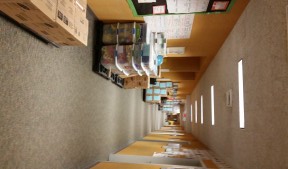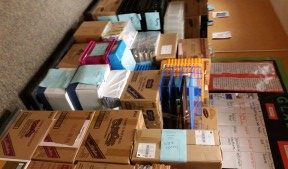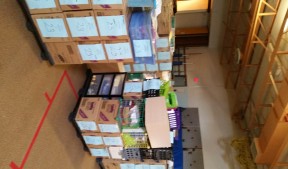T IS For Targets
Learning targets that is! Or Common Core Standards (CCSS). All but a few states have adopted the new standards and they’re either already teaching them in their classrooms fulltime or are they are gradually introducing them as curriculums become available. CCSS seems overwhelming but several school districts have already unpacked the standards and laid out how they will teach them to their students. A couple of things to know about the new standards your child will need to meet are:
- Remember that these standards are what is expected of your child by the end of the school year. SO don’t panic when you see that long list of things they need to know. They will get there.
- There are lots of books out there about the standards but unless you’re a teacher or really, really interested in every last detail of the CCSS, it is quicker and easier to use the internet. Several school districts across the US have already unpacked the standards and made them easier to read. Here are a few examples are you to look at.
https://www.ocps.net/lc/southeast/eoa/parents/Pages/CCSS-Parent-Guides.aspx
The most important thing to remember is not to worry. Your child’s teacher will be able to answer any questions you have about the standards and how your child is meeting them.
S IS For Snack Time
Kindergarteners love snack time. In the districts that I have taught in, kindergarteners come to school all day. This is great when it comes to learning time, we get so much more accomplished now. But it is not so great when it comes to being hungry and tired. And believe me for the first half of the school year they get very hungry and tired by the end of the day. Going to kindergarten is so different than daycare, preschool or home just in the fact that they can’t take a nap when they need to (if at all) and there is not much time for snacks.
In my school, we do have a short snack time for the first half of the school year. So do other schools in the district, but each school handles snacks and how we have them differently. At the school I teach at, we ask parents to provide a healthy snack each day if they would like or we provide goldfish crackers or pretzels for the kids who don’t have a snack each day. Another school in the district has parents each provide a box of crackers, goldfish, or pretzels as a part of their school supplies at the beginning of the year. The teachers then store them and hand them out as the year goes by. But what ever the differences are with the schools here are a few quick tips on snack time:
- Make sure to ask your teacher if they have a snack time each day or not and if they do, what do you need to do to help. If they do or not it is also a good idea to make sure your child knows how important it is to eat their breakfast and their lunch each day so they do not get to hungry.
- If your child has food allergies please make sure the teacher, office and nurse know about it immediately. Schools will often ask you to provide your child’s snack throughout the school year for safety reasons. But you need to make sure everyone knows up front that snacks are not an option for your kindergartener.
- If another child in the classroom has a food allergy please try hard to avoid sending that food item to school for your child just as a precaution. Some children are allergic to the oils of the food item and just touching it on a desk or someone’s hands can be a danger.
- Check to see if your school is peanut or nut free. Many schools are now asking students, teachers and all school employees to avoid bringing peanut and peanut products to school. This year I had a student in my room that was allergic to tree nuts. I choose to stop bringing almonds and nuts in my lunch for the year just as a precaution. None of us want to see a child have an allergic reaction.
- If your child has a food allergy, check to see if you can provide snacks or foods they can eat in an airtight container to be stored in the classroom or school freezer. Many classrooms have parties, birthday cupcakes, etc… If your child does not have a food item from you, they will have to go without on those spur of the moment special occasions. I ask parents to provide items that I keep put away for those last minute surprises.
- Lastly, if you want to provide a snack for the class, please contact your child’s teacher at least a week before hand. This will give the teacher time to call the parents of students with food allergies and work out an alternative for their snack. If you are thinking about providing a special birthday treat, please do the same. We often have students that do not celebrate birthdays and need to find other accommodations for them as well as checking on our food allergy students.
Remember, communication is the key to a successful year. Your child’s teacher and the other parents will really appreciate you taking the extra time to make sure the entire class is safe and respected. J
R Is For Responsibility
Every stage in a child’s life helps them to take steps toward eventually begin an independent adult, but kindergarten seems to be one of the bigger steps. For a lot of children it is their very first time in a school setting. For most it is their first time in a big school with lots of other children. Since kindergarten is a great time to gain more and more independence and responsibility, here are a few things that we would like students to be able to do on their own as the school year proceeds:
- Take care of the library book. I try to get my students to keep their library book in their backpack when they are not reading it to keep it from getting lost. When the book does not come back on library day I often hear, “My mom forgot to put it in my backpack!” WHAT??? You will hear me telling my students that their library book is their responsibility and not their mom’s. OK, but I am realistic, I have 5 children, I remember looking for a lot of library books also. But that said, try to get them to keep their library book in a special place (high up from younger siblings) or in their backpack so they know where it is and are responsible for bringing it back to school.
- Homework is another way to help them be responsible. Of course, they will need your guidance in doing the homework, but taking it back and forth from school and remembering to turn it in will help build their responsibility.
- Asking them to be responsible for notes and items going back and forth to school such as coats, hats and gloves. If something is lost, try to get them to come in and ask me if I have seen it. The more they become responsible throughout the year for their own items the better.
- Make them responsible for telling you how their day went and what they did each day at school.
As you can see, none of this is earth shattering. These are all things you already work on with your kids. Step by step we will help them grow into first graders and their independence will grow with that.
Q Is For Questions
When my kids were little and in school I used to drive them crazy with questions on how their day at school went. Of course I always got the same answers. We didn’t do anything today, or the same old thing, were two of their favorite answers to anything I asked about what they did during their day. But ask I did, every day after school through all five of my own children’s educations.
Even though they didn’t always give me a great answer, they always knew I was interested. And there were plenty of times I got great answers about their day away from me. Leading to great conversions about everything they were excited about.
But more importantly were those days when they came home from school and couldn’t wait to spill the beans about something that had happened and upset them. Those teachable moments when I could help them better understand our society and how it works.
Don’t forget to ask those questions and discuss the day with your child when you get home each evening. If you find out something is wrong and your child needs help with something or someone at school, please don’t hesitate to call your child’s teacher and talk to them about what is going on. A lot of times kids will not tell me when they are being teased or bullied but they will go home and tell their parents. I love it when their parents contact me. I want all kids to be safe and feel safe at school. If your child is not feeling comfortable at school, make sure their teacher knows and learn how their teacher plans to help your child.
Ask those questions! Let us know when we can help you! And enjoy your child’s answers. They are often the best part of a parents day.
Teachers Are Packrats
Or at least this teacher is!!!!
Last year I moved districts after 13 years of teaching in the same, wonderful little country school. I decided it was time to move closer to my home (no more 45 minute one way commutes for me) and left feeling excited for my new adventure. That was until it was time for me to pack up all my 13 years of junk I had accumulated in my classroom. Who knew teachers were such pack rats? Obviously not me, since I happily kept everything from two different grade levels and thirteen years of teaching, and never gave it a second thought.
But pack it all up I did! My wonderful daughter and her extremely patient husband said, “Bring your stuff to our basement for the summer! It will be no problem!” So I did! I filled their 900 square foot basement with my junk!
I spent the summer cleaning it out and by August I was so proud of myself! Half of my junk had been gifted to others in need of books, games, and laminated fun things.
I started my new year, in my new school with lots of nerves and apprehension! But also with a strong sense of pride (change is not really my friend!), I had changed districts and gotten rid of half of my wonderful junk. So, the school year was moving along nicely and then the new school district (remember I took that 25 minutes off my commute each morning) announced we would be moving out of our building at the end of the year and into a temporary school for two years. The recent bond had passed and they were ready to replace our also 80 year old building and 12 portables we used to house our wonderful student body in.
But wait, that meant I had to pack again and store my stuff again! Yikes! And my wonderful daughter and son-in-law had purchased a new house which did not include a basement! So, I packed my many teacher treasures once again (mind you I started a month ago and finished yesterday on the last day of school). I gave away everything I hadn’t used in in a year (boy, was that hard!) thanks to my teaching partner Kendall! She was wonderful at keeping us all in the mind set of “if we didn’t use it this year, we don’t need it!” So, we threw away, gave away and packed up pallets galore. And in the end, I only had one car load of treasures to take to my house this time. All of it junk I couldn’t figure out how to pack in the district approved size boxes! So, now we will be housed in the districts temporary school (they move schools in and out of it as they remodel or rebuild the aging schools in our area) for two years. It is old, at least 90 years, and has no air-conditioning with high ceilings, old wood floors and huge heavy doors! It will be an adventure or at least that’s what our principal keeps trying to tell us. And my number one goal is? Not to keep anything I really, really don’t need! I have to move again in two years!
P Is For Picking Your Child Up
Students get home from school in a variety of ways everyday and everyone involved in your childs education is working hard to make sure all 500 of the kids in the school get where they need to be each day when that final bell rings. There are ways you can help us out to ensure your child is going to the right place with the right person.
- Make sure you know the bus route and times of the bus your child will be riding on.
- If your child walks home, please make sure the office and their teacher know who they are to walk home with each day and where they are going.
- If you are planning to pick your child up each day make sure the office and teacher knows who will be picking them up.
That said, let’s talk about changes! And changes happen! Sometimes they are because of emergencies, other times because of a change in work or babysitter and more often than you think they are because someone is running late or there is some type of situation keeping you from getting to the school on time. Here are a few pointers to hopefully help everyone out in these situations.
- Make sure you have filled out all the emergency forms with the school and have at least 3 people on the list that can pick your child up if you can’t make it.
- If you have a change in bus drop off spots or the person who will be picking up your child please call the office or send a note with your child. I am not going to let your child leave with anyone who is not on that emergency list unless you have let me know beforehand.
- If you have someone that is not allowed to pick up your child from school because of a legal issue, please know that you are going to have to give the school legal documentation to keep that person away.
- Please try to make sure that anyone coming to pick your child up last minute is someone they know. There is nothing scarier to a kinder than to have a friend of a friend have to pick them up (although we do understand emergencies do happen and this is going to come up once in a while).
Finally, when if you are going to pick your child up each day please remember:
- There are about 500 students and adults outside an elementary school walking around when school is dismissed. Please be careful backing up or moving around in your vehicle. Little children do not always pay attention to what you are doing; they are solely focused on their friends.
- If you are going to wait in the car for your child, please make sure you get out of the car as they approach and supervise them getting into the vehicle.
- Never allow your child to walk in the parking lot alone. It is worth the few minutes to get out of the car and walk them to and from the school.
Safety is always our goal when getting kids to and from school and the more you and your child can help us the better! Have a great day!!!
O Is For Open House
I love open house. I loved it when my kids were little and I got to go to school and look around their new classrooms together, met their new teacher and saw the excitement in their eyes as they readied themselves for a new adventure. Now, as a teacher, I still love open house. I love getting to meet my students and their parents for the first time, and watching them look around in wonder at all the new things in the classroom. But I think my favorite thing as a teacher when it comes to open house, is knowing that I am able to help squash a few of those first day jitters down before school even starts. Here are a few things that might help you with open house.
- If it is at all possible please try to go to your child’s open house or send them with a family member such as a grandparent, if you cannot make it.
- Make sure you check for the date of open house early in August. Every school does open house different. I have worked at schools that had open house three weeks after school started and schools who had open house the week before school began.
- Remember, open house is a meet and greet activity. Please don’t ask your teacher how your child is doing in class or about their behavior. If you have questions concerning your child’s learning or behavior please call the school and make an appointment for a meeting with your teacher.
- Make sure you check out the library, gym, music room, office and playground while you are at open house as well.
- If your child has a good friend that is also coming to the same school in the fall, come to open house together. It really breaks the ice when the kids can go around the school together and look around.
Most importantly, enjoy your evening at school. Look for fun things and make good memories about coming to meet your teacher for the first time.
N Is For Newsletter
Both school offices and student classroom teachers tend to send home newsletters during the school year. These are great ways to stay updated. Make sure you know what day of the week these come home on and how often to expect them, so you can check your child’s backpack . Also, always feel free to call the office or teacher if you have questions about the newsletter or upcoming events at school. We love helping our parents out and it’s a great way to maintain that important teacher/parent connection.
M Is For Math
Gone are the days of coming to kindergarten knowing how to count to 10 and leaving knowing your numbers to 20 and how to make a pattern. CCSS now requires kindergarten students to learn a multitude of different math concepts including but not limited to adding, subtracting, knowing the difference between 2D and 3D shapes and how to skip count by 10’s. That being said please don’t panic. These are all things your child will need to know by the end of kindergarten. So what can you do to help?
- Check your child’s backpack daily for worksheets and math ideas they are working on in class. Make sure you discuss the concept with your child. Have them show you what they did in math that day in school.
- Get a copy of the CCSS standards for parents from your teacher or on-line. That way you will not be surprised by how much is expected of your child throughout the school year.
- Count, count, count and then count some more. The more experiences your child has with counting items the better they are going to understand the concept and then be able to build on what they know during the school year.
- Practice skip counting by 10’s at home. Skip counting orally takes lots of practice. If you practice at home also, it will help.
- Have your child help you when you are using measuring cups, measuring spoons, tape measurers, counting out money, telling time, etc. Anytime you are doing something with math, mention it to them. A lot of the skills take time and a lot of exposure to finally understand. The more your child sees the concepts the better.
- Most importantly be excited about math. A lot of us are afraid of math and think we don’t understand it. That attitude rubs off on our kids. If you seem excited about math your child will think it is an easy thing to learn, and be excited too!
L Is For Library
Library is a fun experience for kids. For most students it is the very first time they get to check out a book and take it home to read. But with that checkout comes lots of first time responsibility. They have to get it home, keep it away from littler siblings, and get it back. As a teacher, I love that they are learning this responsibility but I also fret a lot about library time because it often becomes a very stressful class for some students. Here are a couple of ways you can help your child lessen their worries when it comes to library.
- Make sure you know which day during the week your child has library checkout.
- Keep the library book in their backpack unless they are reading it. That will insure they have it on library day for checkout time.
- Ask the teacher if they have place to store the book in the classroom if your child returns it a few days earlier than the next library day. I have a basket in my room they can keep their library books in or I let them keep them in their cubbies.
- If your child accidentally loses the book. Let us know. We can look for it in school, check buses, etc. If it can’t be found, you can pay for the book so your child can check out again.
- If the book is damaged, please return it and let us know. Our Librarians are wonderful at fixing books. Accidents happen, and I want the students to know we will work it out.
- Some schools only allow children to check out books within their reading levels while others allow students to check out a topic or book that interest them. Find out how your school library decides what can be checkout so you can talk to your child about their choices of books.
Lastly, enjoy these borrowed books with your child. Building a love of life long reading is very important to all child’s future and it can be a really fun activity to do together each week.






